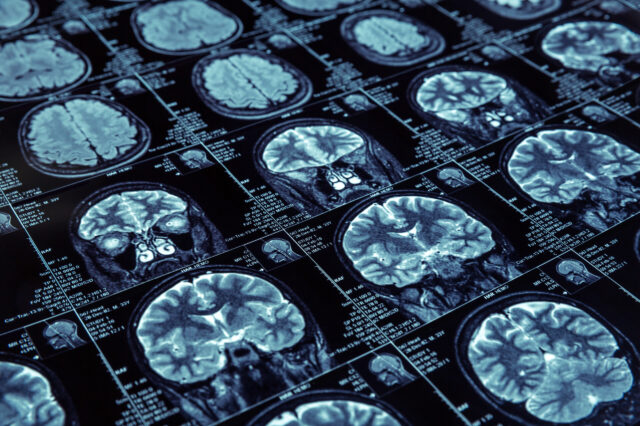Definition
A concussion may occur when the head hits an object, or a moving object strikes the head. A concussion is a less severe type of brain injury. It may also be called a traumatic brain injury.
A concussion can affect how the brain works. The amount of brain injury and how long it will last depends on how severe the concussion is. A concussion may lead to headaches, changes in alertness, loss of consciousness, memory loss, and changes in thinking.
Alternative Names
Brain injury - concussion; Traumatic brain injury - concussion; Closed head injury - concussion
A concussion can result from a fall, sports activities, vehicular accidents, assault, or other direct injury to the skull. A big movement of the brain (called jarring) in any direction can cause a person to lose alertness (become unconscious). How long the person stays unconscious may be a sign of how bad the concussion is.
Concussions do not always lead to loss of consciousness. Most people never pass out. They may describe seeing all white, all black, or stars. A person can also have a concussion and not realize it.
Symptoms
Symptoms of a milder concussion can include:
- Acting somewhat confused, feeling unable to concentrate, or not thinking clearly
- Being drowsy, hard to wake up, or similar changes
- Headache
- Loss of consciousness for a fairly short period of time
- Memory loss (amnesia) of events before the injury or right after
- Nausea and vomiting
- Seeing flashing lights
- Feeling like you have "lost time"
- Sleep abnormalities
The following are emergency symptoms of a more severe head injury or concussion. Seek medical care right away if there are:
- Changes in alertness and consciousness
- Confusion that does not go away
- Seizures
- Muscle weakness on one or both sides of the body
- Pupils of the eyes that are not equal in size
- Unusual eye movements
- Repeated vomiting
- Walking or balance problems
- Unconsciousness for a longer period of time or that continues (coma)
Head injuries that cause a concussion often occur with injury to the neck and spine. Take special care when moving people who have had a head injury.
Exams and Tests
The health care provider will perform a physical exam. The person's nervous system will be checked. There may be changes in the person's pupil size, thinking ability, coordination, and reflexes.
Tests that may be done include:
- Blood and urine tests
- EEG (brain wave test) may be needed if seizures continue
- Head CT (computerized tomography) scan
- MRI of the brain (magnetic resonance imaging) of the brain
- X-rays
Treatment
For a mild head injury, no treatment may be needed. But be aware that the symptoms of a head injury can show up later.
Your providers will explain what to expect, how to manage any headaches, how to treat your other symptoms, when to return to sports, school, work, and other activities, and signs or symptoms to worry about.
Both adults and children must follow the provider's instructions about when it will be possible to return to sports.
You will likely need to stay in the hospital if:
- Emergency or more severe symptoms of head injury are present
- There is a skull fracture
- There is any bleeding under your skull or in the brain
Outlook (Prognosis)
Healing or recovering from a concussion takes time. It may take days to weeks, or even months. During that time you may:
- Be withdrawn, easily upset, or confused, or have other mood changes
- Have a hard time with tasks that require memory or concentration
- Have mild headaches
- Be less tolerant of noise
- Be very tired
- Feel dizzy
- Have blurry vision at times
These problems will probably recover slowly. You may want to get help from family or friends for making important decisions.
In a small number of people, symptoms of the concussion do not go away. The risk for these long-term changes in the brain is higher after more than one concussion.
Seizures may occur after more severe head injuries. You or your child may need to take anti-seizure medicines for a period of time.
More severe traumatic brain injuries may result in many brain and nervous system problems.
When to Contact a Medical Professional
Call the provider if:
- A head injury causes changes in alertness.
- A person has other worrisome symptoms.
- Symptoms do not go away or are not improving after 2 or 3 weeks.
Call right away if the following symptoms occur:
- Increased sleepiness or difficulty waking up
- Stiff neck
- Changes in behavior or unusual behavior
- Changes in speech (slurred, difficult to understand, does not make sense)
- Confusion or problems thinking straight
- Double vision or blurred vision
- Fever
- Fluid or blood leaking from the nose or ears
- Headache that is getting worse, lasts a long time, or does not get better with over-the-counter pain relievers
- Problems walking or talking
- Seizures (jerking of the arms or legs without control)
- Vomiting more than 3 times
If symptoms do not go away or are not improving a lot after 2 or 3 weeks, talk to your provider.
Prevention
Not all head injuries can be prevented. Increase safety for you and your child by following these steps:
- Always use safety equipment during activities that could cause a head injury. These include seat belts, bicycle or motorcycle helmets, and hard hats.
- Learn and follow bicycle safety recommendations.
Do not drink and drive. Do not allow yourself to be driven by someone who may have been drinking alcohol or is otherwise impaired.
References
Liebig CW, Congeni JA. Sports-related traumatic brain injury (concussion). In: Kliegman RM, St Geme JW, Blum NJ, Shah SS, Tasker RC, Wilson KM, eds. Nelson Textbook of Pediatrics. 21st ed. Philadelphia, PA: Elsevier; 2020:chap 708.
McClincy MP, Olgun ZD, Dede O. Orthopedics. In: Zitelli, BJ, McIntire SC, Nowalk AJ, Garrison J, eds. Zitelli and Davis' Atlas of Pediatric Physical Diagnosis. 8th ed. Philadelphia, PA: Elsevier; 2023:chap 22.
Papa L, Goldberg SA. Head trauma. In: Walls RM, Hockberger RS, Gausche-Hill M, eds. Rosen's Emergency Medicine: Concepts and Clinical Practice. 9th ed. Philadelphia, PA: Elsevier; 2018:chap 34.
Trofa DP, Caldwell J-M E, Li XJ. Concussion and brain injury. In: Miller MD, Thompson SR, eds. DeLee Drez & Miller's Orthopaedic Sports Medicine. 5th ed. Philadelphia, PA: Elsevier; 2020:chap 126.




